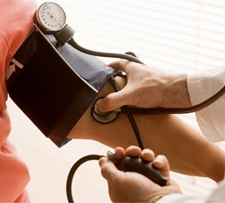|
 WARNING:
WARNING:
If you have chest pain (angina) or have heart disease (e.g.,
coronary artery disease, ischemic heart disease, high blood
pressure), do not stop using this drug without first consulting
your doctor. Your condition may become worse when the drug is
suddenly stopped. If your doctor decides you should no longer use
this drug, you must gradually decrease your dose according to your
doctor's instructions. When gradually stopping this medication, it
is recommended that you temporarily limit physical activity to
decrease the work on the heart. Seek immediate medical attention
if you develop: worsening chest pain, tightness or pressure in the
chest, chest pain spreading to the jaw/neck/arm, sweating, trouble
breathing or fast/irregular heartbeat.
 USES:
USES:
This medication is a beta-blocker used to treat chest pain
(angina) and high blood pressure. It is also used after an acute
heart attack to improve survival. High blood pressure reduction
helps prevent strokes, heart attacks and kidney problems. This
drug works by blocking the action of certain natural chemicals in
your body such as epinephrine on the heart and blood vessels. This
results in a lowering of the heart rate, blood pressure, and
strain on the heart.
 OTHER USES:
OTHER USES:
This medication may also be used for irregular heartbeats, heart
failure, migraine headache prevention, tremors and other
conditions as determined by your doctor.
 HOW TO USE:
HOW TO USE:
Take this medication by mouth, usually once daily; or as directed
by your doctor. Use this medication regularly in order to get the
most benefit from it. To help you remember, use it at the same
time each day. This drug is not effective if you use it only when
chest pain or a migraine headache occurs. It is very important to
take this medication regularly as prescribed to help prevent these
conditions. The dosage is based on your medical condition and
response to therapy. It may take one or two weeks before the full
benefit of this drug takes effect. It is important to continue
taking this medication even if you feel well. Most people with
high blood pressure do not feel sick. Do not suddenly stop taking
this medication without consulting your doctor. Your condition may
become worse when the drug is suddenly stopped. Refer to the
Warning section.
 DRUG INTERACTIONS:
DRUG INTERACTIONS:
This drug should not be used with the following medications
because very serious interactions may occur: mibefradil. If you
are currently using any of these medications, tell your doctor or
pharmacist before starting this drug. Before using this
medication, tell your doctor or pharmacist of all prescription and
nonprescription products you may use, especially of:
alpha-blockers (e.g., prazosin), anti-diabetic drugs (e.g.,
glipizide, glyburide, insulin), calcium channel blockers (e.g.,
diltiazem, verapamil), epinephrine, general anesthesia,
non-steroidal anti-inflammatory drugs (e.g., indomethacin,
ibuprofen), other heart drugs (e.g., digoxin, quinidine), other
drugs to treat high blood pressure (e.g., clonidine, reserpine).
Check the labels on all your medicines (e.g., cough-and-cold
products, diet aids) because they may contain ingredients that
could increase your heart rate or blood pressure. Ask your
pharmacist about the safe use of those products. Do not start or
stop any medicine without doctor or pharmacist approval.
 OVERDOSE:
OVERDOSE:
If overdose is suspected, contact your local poison control center
or emergency room immediately. US residents can call the US
national poison hotline at 1-800-222-1222. Canadian residents
should call their local poison control center directly. Symptoms
of overdose may include unusually slow heartbeat, severe
dizziness, slow or shallow breathing, weakness, or fainting.
|






